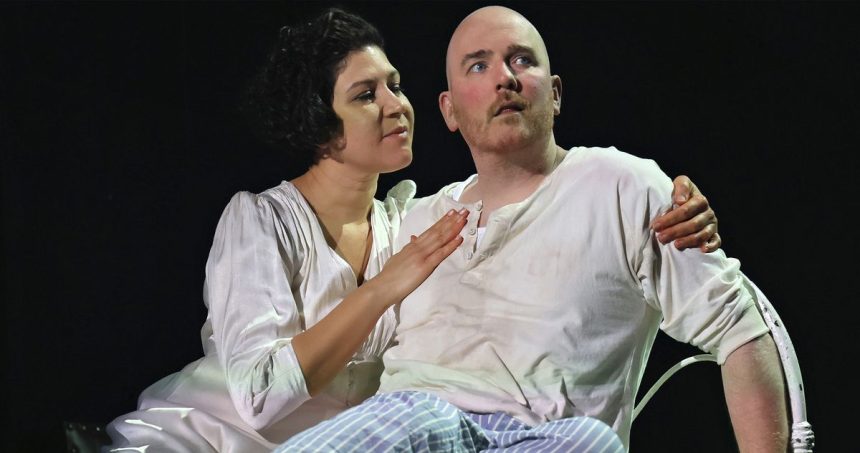I’m a Merriam-Webster-certified fan of the early-aughts Canadian TV series Slings and Arrows, a loving and lacerating theater satire about the artists and administrators at a big Ontario Shakespeare company. Each season chronicles and draws its themes from the production of a certain play, and as much as I adore the series, certain aspects of season two, about Macbeth, frustrate me to no end. Here’s Ellen, the company diva, talking to Geoffrey — currently her artistic director, director, and boyfriend — about Lady Mac:
Exactly how is she weak? I mean, I know she has some weakness because she goes mad, but for the first half of the play she is so overpowering … So? When does she crack? And why? And is it evil that has given her her strength? Is it an unnatural cruelty?
She doesn’t get any answers, but what always bothers me is that she’s not asking the right questions — or rather, she’s asking questions that assume a fairly facile reading of the play. And she’s not alone: An almost identical set of questions seems to have informed the creation of Zinnie Harris’s Macbeth (an undoing), a revision of the play now visiting Theatre for a New Audience from the Royal Lyceum Theatre Edinburgh.
The back half of Harris’s title is threefold: She’s still depicting the unraveling— psychological, interpersonal, political — that occurs after the new Thane of Cawdor and his wife murder King Duncan. But she’s also setting out to undo centuries of misogyny and marginalization: Her play is a quest to flesh out Macbeth’s “dearest partner of greatness” on her own terms, to allow Lady Mac to — as the saying goes — take up space. As such, it’s (third fold) a wink and a middle finger at the idea, perhaps the character’s most famous, that “what’s done cannot be undone.”
So far, so interesting. Lady Macbeth is a fascinating figure, both inside and outside the play she inhabits. Like her husband, she was a real person—her name was Gruoch — and she was originally married to a different warlord called Gille Coemgáin, who died when he and 50 of his men were burned alive. Probably by Macbeth. Who was his cousin. Whom Gruoch then married. That’s hot shit, and we’re not even at the play yet! Shakespeare makes things hotter still. His Macbeths are fictions but all the more vivid for it. Part of what makes their story so devastating is how wildly into each other they are at the start — their relationship feels sexy, intense, communicative, modern. They’re partners, even soulmates, and what they do not only throws a country into turmoil; it destroys them, both as mates and as souls.
Macbeth (an undoing) cleaves to this trajectory: As Carlin (Liz Kettle) — a brusque, sly narrator who’s also the first among the “weird sisters” — announces to us at top-of-show, “It’ll be as you last saw it — but no matter, things fare better when they are played and played again.” But what makes this replaying chafe, especially the further it goes, is that Harris seems far less interested in souls than she is in simply redistributing power. Macbeth, after all, is play about conscience, that microscopic worm that, once it’s slipped in, can grow into a monster in the mind, but that, if it’s shut out, can turn a person into a monster. The woman who begins the play by praying for hardness and cruelty is decimated by the return of the conscience she thought she banished. The man who begins it in fear, with “no spur to prick the sides of my intent,” turns to thoughtless action, steamrolling violently ahead to keep his conscience at bay. That Harris reimagines these story lines isn’t a problem; the fact that compunction plays no role in them is. For all its progressive intentions, her play charges right into the trap that feminist retellings so often — and so irritatingly — set for themselves: It values empowerment above all. At the end of the day, all that matters is that its leading lady is strong.
“Let them see me as I should be remembered,” says this Lady Macbeth (Nicole Cooper) near the end of the show, as she faces her fate: “fearless, powerful, and unrepentant.” Okay, but … why? Why is it impressive to be unrepentant after committing and/or ordering a whole bunch of murders, including the execution of your own cousin? (In this version, Lady Macbeth holds sway once she and her husband ascend the throne, and Lady Macduff, played by Emmanuella Cole, is related to her and is sister-close, at least until it’s time to kill.) Impenetrable strength isn’t actually a very interesting quality onstage. Save it for “Bitch Better Have My Money.” Moreover, its thematic centering raises grating ironies: Isn’t the valorization of strength, and the corresponding demonization of so-called weakness, inherently patriarchal? Why is it a sign of weakness that Shakespeare’s Lady Macbeth “goes mad”? Is mental illness weakness? Is conscience weakness? In setting out to give women more scope onstage, why do we so often focus on power dynamics — essentially swapping them with men in a conventional Who’s in Charge hierarchy — rather than on breadth of humanity?
Where humanity is concerned, Macbeth (an undoing) fares far better before its intermission. Harris has created a sort of braided text, intertwining her own writing and Shakespeare’s, which deserves credit for gutsiness and ambition, even if the result sometimes clunks in the ear. That braid is tightest in the first act, as Harris’s actors (she also directs) duck into iambic pentameter regularly — though never, it should be said, with blazing force. By contrast, their stretches of contemporary speech often feel, in a good way, like we’re getting to attend a rehearsal. When Lady Mac spots a lucky ladybug on her husband’s sleeve, or Macbeth (Adam Best) grumbles “Ah for fuck’s sake” in response to his wife’s demand that he wear his tails for the arrival of King Duncan (Marc Mackinnon), there’s the lively sensation of watching actors improvise around a set of given circumstances: This is the work that often remains invisible — the kind of playful, speculative expansion upon a text that can give depth and contour to the eventual shape seen by the audience. These moments, especially the ones that fill out the central couple’s domesticity, are Harris’s best. After Duncan’s murder, as Macbeth is starting to fray into paranoia and panic, Lady Macbeth has room for a full-bodied, emotionally truthful response: “Full of scorpions is my mind, dear wife,” he says. “Then talk to me?” she replies. He is — as in Shakespeare’s play — starting to abandon her, to isolate himself within his own mind, but here, she gets more language, more tools to try to hold onto him as he slips away.
But once he slips, so does the play. In Harris’s second act, as Lady Macbeth assumes royal command in place of her husband — he’s the one wandering around mumbling and washing his hands — Shakespeare’s language gets moved to the back burner, replaced by something much more heavy-handed. Ever since Carlin’s prologue, we’ve been aware that we’re inside a porous container. This is a play — Carlin knows it, we know it, even Lady Macbeth knows it, and it’s ultimately the play itself that will prove her greatest oppressor. Things start to break down around her: “This is not the scene!” Cooper calls out at one point as a lightbulb flashes and the witches’ voices haunt her. Later, when blood mysteriously appears on her dress, she shouts for a “stage manager, technician, anyone backstage,” insisting — as both actor and character — that she “won’t have a dirty dress.” Harris has a potentially compelling conceit on her hands — that Macbeth’s breakdown is psychological while Lady Macbeth’s is metatextual; the character is under attack not by her own psyche but by her own story — but she’s ultimately driving it to a place that’s neither sufficiently nuanced nor fully coherent.
“They were right when they said this play is cursed,” says Lady Macbeth when she at last directly encounters Carlin and her fellow weird sisters, Mae (also Cole) and Missy (Star Penders, who’s the treat of the whole show here and in her role as Duncan’s useless teenage dirtbag son, Malcolm). “I understand that now — we’ve been stuck in these played-out scenes for hundreds of years … As long as they want blood, and the madness of women, we are here to give it to them, is that it?” But is that what an audience wants? And is it all Macbeth has to give? Carlin has also been prodding us from the jump with simplistic jabs about why we’ve all shown up at the theater: “You recognize yourself?” she leers. “Mouths open, tongues out. You’re all the same. Death is what you want.” After intermission, her would-be edgy patter gets even more tired: “Still here? Eating an ice cream? Very good. Glass of wine in your hand — excellent — the story’s gruesome but why should that stop your need to consume?” Oh, please. Condescension is an unworthy approach to take with an audience, especially one who has shown up specifically to see you do something different and radical with a gnarly old play. As for that old play — well, yes, it was unquestionably, to quote this particularly delightful diatribe, written “in an age where women were literally male property.” But for all that, it pushes back at (an undoing) with a power more radical than that with which Harris seeks to imbue Lady Macbeth. What Harris has set out to undo isn’t actually Macbeth: It’s generations of facile discourse around Shakespeare’s play, discourse that’s all too apt to be equated with the play itself.
“This is the final scene,” says Mae to Lady Macbeth as the Scottish queen’s road is running out. But it’s not, really. Harris doesn’t quite know how to wind things up — a sign of lacking clarity deep down in your engine — and Macbeth (an undoing) has roughly as many endings as The Return of the King. But the gist of them all is a kind of bitter lament: a eulogy to this powerful woman crushed and limited by the words and worlds of men. What does she have to show us, though, besides power? Another iron fist, this time in a dress? By all means, give us more of Gruoch, but give us her conscience — and her consciousness, that crucial dawning realization of moral catastrophe that lives at the heart of her play. Give us her soul. Though he may not have written his Lady Macbeth a contemporarily satisfying number of lines, Shakespeare left doors open in terms of both psychology and circumstance. We are the ones who close them and then blame the play when we run into a wall.
Macbeth (an undoing) is at Theatre for a New Audience through May 4.











